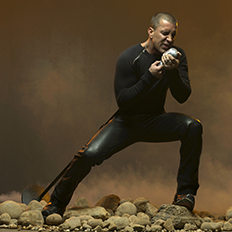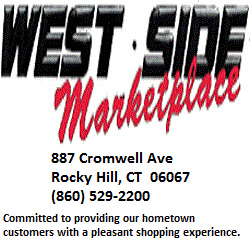

Face the Music Artist Interview: Scott Stapp of Creed
By JOBY ROGERS
MIDDLETOWN - Born and raised in Orlando, Fla., Scott Stapp is perhaps best known as the front man for the 90’s paramount group Creed. Recognized for mixing post-grunge sounds with Christian spirituality, Creed has won multiple Grammy, aVideo awards. With the 1997 release of My Own Prison followed with Human Clay in 1999 and capitalized with Weathered in 2001, Creed collectively sold over 40 million albums worldwide.
The group split in 2004. Ten years later, after arrests, suicide attempts and a brief Creed reunion, Stapp hit bottom, posting a now famously peculiar video to Facebook in which he claimed he was broke, homeless and â€Ĺ"under some kind of vicious attack.”
Diagnosed with bipolar disorder, exacerbated by drug and alcohol abuse, Stapp sought treatment. He is currently in what he says is an effort to rebuild his life. Now sober and in treatment and very open about his precipitous fall and recovery, he has released a solo album justly titled Proof of Life, which confronts head-on his personal journey for atonement.
Stapp now devotes himself to â€Ĺ"paying it forward” to others in need through numerous outreaches. His creativity, passion and desire to be transparent in his struggle never waned and was very evident in our conversation.
Hello, Scott. This is Joby Rogers of ‘Face the Music’.
Hey Joby how are you?
I’m fine. Thanks Scott.Where are you calling from?
I’m in Boca Raton, Fla..
I’m here in Connecticut.
Oh, I bet it’s cold up there, huh?
15 degrees as we speak.
Wow. I’m spoiled, man it’s 75 degrees today (laughs).
Do you feel that you are in a good place now, Scott?
You know, I really do. And that’s a good question given the history of the last year and everything that I’ve been through and at this point have overcome. Everything is a daily commitment to me because I really changed my life. It’s something that I have to work at every day and so to answer your question, yeah. I really do feel like I’m in a good place.
Which one of your songs do you feel is most autobiographical?
Wow. You know, to be honest with you, they all are. That’s kind of been the place that I’ve written from my entire career.
Which song is your favorite to perform on stage and why?
I have a few but I think my my all-time favorite to perform on stage is a song called â€Ĺ"Faceless Man.” It’s off the Creed Human Clay record.
What song of yours do you feel you’re most proud of?
Wow! I’ll tell you there’d have to be more than one. I think songs like â€Ĺ"My Sacrifice,” â€Ĺ"One Last Breath” and â€Ĺ"My Own Prison” from Creed. Then going to my solo records, â€Ĺ"Surround Me,” â€Ĺ"Justify” and â€Ĺ"Proof of Life” off my latest solo record. â€Ĺ"Dying to Live” and â€Ĺ"Crash.” There’s a few, and all for their own unique reasons. Some of it has to do with lyrical content and lyrical direction and some of it has to do with how they impacted the fans and how they’ve connected with the masses.
If you were only allowed to release one song of yours that you could share with the world, which would it be?
Wow! That’s a really good question. Solo or Creed?
Your choice.
Man, I don’t think I could just say one, but since you’re going to have me on the spot I need to answer that, right? Man, that is tough. I’m sitting here trying to scroll through nearly a hundred songs in my head. I think from my latest solo record it would be â€Ĺ"Only One.” And from the last Creed record, which was Full Circle, which came out 2009 it would be a song called â€Ĺ"Time.”
Do you remember the first song you ever performed in public?
Yes I do. â€Ĺ"Yesterday” by The Beatles. I was nine years old and that was my first solo performance.
How do you approach songwriting? Is there a song you have written that seemed to come out of nowhere already complete?
There’s been quite a few that just came out of nowhere and have been completed start to finish in five minutes. Some examples of that are â€Ĺ"Arms Wide Open” and â€Ĺ"My Sacrifice.” It’s really unique how every song is born and every song is a little different. Some songs start with the music. Some songs start with the lyrics. Some songs are kind of a stream of consciousness where the music and the lyrics all come at the same time. I can’t ever predict how it’s going to happen and, to be honest with you, I have a hard time just sitting down and trying to make it happen. It has to be real organic. It all stems from moments of inspiration. As an artist, there are times when you are not inspired, but I’ve been lucky and really blessed that I’ve had plenty of counter-moments of inspiration.
Your music has been defined as everything from Christian rock to heavy metal. I personally believe it stands alone. How would you define your music?.
I definitely can understand the Christian characterization, being that a lot of the lyrics and some of the songs come from a Christian perspective--as a Christian kid trying to figure out his life and trying to figure out life with that as its basis. I definitely understand the heavy metal characterization because Mark Tremonti is just an amazing guitar player and an amazing talent and an amazing artist and he’s heavily influenced by heavy metal, and I think that came through in our music, so I understand those two characterizations. And I think that the best way I would describe it--this goes for Creed and my solo work--I would describe it as anthemic rock.
I know you’re always working on new material. When writing a new song or album, do you retain any pressure from your past work and successes?
Early in my career I didn’t. And that goes for the first three Creed records. I felt no pressure whatsoever. But I think the older I get and the more albums that I write, I can’t help but put a little personal pressure on myself. â€Ĺ"Hey man, you got standards you got to live up to.” I use that fuel to kind of push myself. But I think early on and writing with blinders on and not allowing the success of My Own Prison to affect Human Clay and then not allowing the success of Human Clay to affect Weathered or put any pressure on me was the reason those three albums were so successful. I think if I had really understood the enormity of what was happening it could’ve definitely got inside my head. So I’m glad I was flying with blinders on.
What do you think of the theory that great art or songwriting comes from hunger and pain?
Well, I’ll tell you a lot of mine has. I can’t really say that that’s the only place that great art can come from, but I definitely can say that a lot of mine has.
I’ve listened to â€Ĺ"Proof of Life” and it plays like a struggle with, and then a return to, faith. You write about internal suffering and the consequences of the choices you make and asking the eternal question, â€Ĺ"what’s your proof of life?” How did you come up with such a thoroughly layered song index?
There was a lot of time between solo records and a lot of life was lived and I had gone on quite a few journeys in terms of trying to overcome things and thinking that I had overcome something to have it happen all over again and to go through it again. So I was really in a struggle and all those emotions came from that struggle of working through something, failing and having to get back up and do it again and at that time in my life I had again reached a point where I thought I had figured it out.
So, Scott, did you figure it out? Have you found your proof of life?
I have. It’s just ironic that it came after the record as opposed to the fact that I thought that I had found it prior to writing that record and so that’s what I wrote about, but I had to go through something else in order to realize what that was
Myself included. I’ve had two friends who have taken their own life. What I’ve learned from those experiences is that committing suicide may end their pain but the pain felt by those left behind goes on forever. We all know someone who’s suffered from bi-polar disorder and depression or has attempted or committed suicide. In the hopes of helping others out there who will read this interview, would you be open to discussing your own personal battle with those topics for a moment?
Absolutely.
What was the hardest and most ominous part of your recovery?
I think the hardest and the scariest part of my recovery was dealing with the aftermath of the crisis. There was such guilt and shame, remorse, humiliation, embarrassment, complete and utter destruction of my self-confidence.
To have it played out in such a public forum had to prove difficult.
Right. All that just compounded everything I just mentioned to you 1000 fold and at my lowest point I didn’t think I’d ever recover and I thought that I had been broken into a million pieces and would never be put back together again. I was broken and I needed to be put back together in a different way that could only have come by what happened.
What role did your wife, Jaclyn, play in that?
She was the glue that put it all back together. I don’t know what I’d do without her. She’s been such a strength and inspiration in my life and really a vocal support guide to help carry me when I couldn’t walk, and I mean that literally as well as figuratively. I always say this to her: â€Ĺ"They don’t make them like you.” I don’t know what I would’ve done without her. I definitely wouldn’t be here.
Hit Parader Magazine ranked you as one of the greatest heavy metal vocalists of all time. Who’s on your Mount Rushmore of rock n’ roll?
In terms of vocalists, I have to say Bono, Robert Plant, Jim Morrison, Chris Cornell--I think any one of those four. I’ve got to throw Mick Jagger in there.
What’s the greatest opening lyric of all time?
Wow! Man, you put me on the spot. Let me think. I’m going to have to pass on that.
Your former Creed bandmate Mark Tremonti and you have tried several attempts at reuniting Creed. Any plans for a solid reunion with Mark, Brian Marshal and Scott Philips?
We’re all committed to different various projects right now. I think that that’s a question that will hopefully be readdressed when the time is right. I can’t speak for those guys, but for myself the door’s always open.
In early 2012, you visited Japan with your wife to promote fundraising for victims of the 2011 Tohoku earthquake and tsunami. What was that experience like? What lessons did you come away with after what must have been such a profound experience?
It was really life-changing to go into villages and see miles and miles of cities completely destroyed. I mean leveled. I remember walking up to a school that was probably five stories tall and a guy was telling us that the principal took all the students up to the roof and thought that they would be safe. Keep in mind we’re 2 or 3 miles inland five stories up. I can’t imagine the fear in the children’s and the staffs faces when they see this wave just keep coming and then realize that five stories up was not enough. Meeting with orphans that had lost their entire family. We saw this one little girl and she had lost her five brothers, sisters, mother and father and was living in this orphanage that was probably a 600 square-foot room with 40 to 50 other people who have lost their families. She was in shock and trauma and hadn’t really looked up from the ground and definitely hadn’t smiled or made eye contact with anyone. I remember doing some music therapy there which is basically me and a friend of mine on acoustic guitars just singing trying to lighten spirits. I remember her little face looking up and after about a half hour a smile coming to her face and the tears streaming down my face as I realized what the future held for this little girl and how tough the road is going to be. It’s experiences like that that really change you forever. They compel you to do something. Get you thinking outside of yourself completely and just inspires you to help others and to put that bug in your heart to want to help as many people as you can. So when other events happen in the world, my wife and I just feel compelled to act because we’ve been to more than Japan. We spent some time in Haiti after the earthquake. With all these experiences, we have such a heart for children who are unfortunate and who lost family and future because of these disasters and that’s where my heart is drawn to help.
I live just 30 minutes from Newtown. That experience shook me to the core. Having children of school-age of my own I can’t imagine the horror the parents must be experiencing.
I can’t even comprehend the deaths and how those parents of those school kids feel.
You happen to see Barack Obama’s address on gun control yesterday?
Yes I did and it moved me. His display of emotion and the sincerity of his heart really moved me. You can see the sincerity in his eyes and how deeply he was affected by these tragedies.
How does the music business reflect on racial tensions in the U.S. and as a working artist what can musicians do to help that situation?
Artists can talk about it. They can write songs that unite people and bring them together. Tear down racial divisions and stereotypes and any negativity. Inspire people through music to come together. I think that’s the best way in my opinion.
What would you tell your younger self about getting in this business?
(Laughs) It’s a job, not a party.
What was your family’s initial reaction to you when you decided to enter show business and be a professional musician?
They were not very supportive of what I was doing at all.
What is something about you that would surprise your fans?
I’ll tell you, at this point I feel like they know everything (laughs). I really feel like I have no skeleton anywhere in my closet.
How about some of your hobbies or spare time antics?
Well, you know, they know that too (laughs). With social media all my highly-publicized missteps are out there.
The Webster Theater in Hartford is an intimate setting. On smaller stages and more intimate crowds, do you have to develop different techniques to connect with a smaller room?
I think I’m just more acutely aware of the audience. When you’re in big arenas or stadiums with all the production that you have you kind of get into your own world because of the separation between the audience and you. You can’t really connect like that. But in the small rooms there is an intimate connection. It’s a source of energy, joy and emotion. I love to feed off that and really connect on a personal level with all the fans there.
What are some of your personal attributes that you’ve brought to the table in order to succeed as an artist in this business?
Definitely my passion. My drive. I think those were important in what I created with Creed and as well as a solo artist. Then my honesty in my song writing and my lyrics. I really feel like that’s connected with people as well.
Who was the one person or artist you’ve met or worked with where you pinched yourself and thought, â€Ĺ"Oh my God, I cant believe this is happening”?
Bad experiences?
No, I mean good experiences.
Oh, good experiences (laughs). Oh, that’s easy. The Doors. When I got a chance to front The Doors on VH1. The week rehearsing with them and being a childhood fan of them and to have that turn into a reality was just an experience I will never forget and one of the greatest experiences of my life.
Has anyone ever given you a piece of advice you actually followed?
Yeah, two. One would be Eddie Van Halen. When we were just starting out, it was in ‘97, we opened for Van Halen at Madison Square Garden and prior to the show Eddie Van Halen came back to our dressing room and poked his head in and was giving us some advice.
â€Ĺ"Don’t work with Dave”.
(Laughs). Well you can’t ever trust what a guitar player and singer say about each other because there’s much more going on there, but yeah you’re absolutely right, he probably would say that. What he said that stuck out to me, but was odd, but I followed, was to always put your hotel room key in your back pocket in case you pass out somewhere, so they’ll know which hotel to take you to. And I didn’t think I’d ever do that, but for some reason ever since he said that the key went in the back pocket just so I was prepared. The other advice we got from a really talented artist named Jeff Martin, of the Canadian band The Tea Party. He really opened Pandora’s Box to Creed as far as experimenting with new and unique guitar tunings, which would later inspire some of Creed’s biggest songs.
Thanks for the time, Scott. I’ll pop down to the Connecticut gig to see you.
Awesome, brother. I look forward to seeing you. Take care.
For more info on Scott Stapp and Creed visit www.scottstapp.com or www.scottstapp.com .








